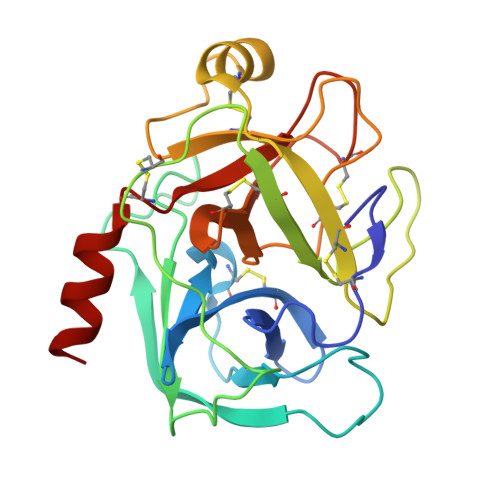Intriguing role of water in protein-ligand binding studied by neutron crystallography on trypsin complexes.
Schiebel, J., Gaspari, R., Wulsdorf, T., Ngo, K., Sohn, C., Schrader, T.E., Cavalli, A., Ostermann, A., Heine, A., Klebe, G.(2018) Nat Commun 9: 3559-3559
- PubMed: 30177695
- DOI: https://doi.org/10.1038/s41467-018-05769-2
- Primary Citation of Related Structures:
5MNE, 5MNF, 5MNG, 5MNH, 5MNN, 5MNO, 5MNQ, 5MNZ, 5MO0, 5MO2, 5MOP, 5MOQ, 5MOS - PubMed Abstract:
Hydrogen bonds are key interactions determining protein-ligand binding affinity and therefore fundamental to any biological process. Unfortunately, explicit structural information about hydrogen positions and thus H-bonds in protein-ligand complexes is extremely rare and similarly the important role of water during binding remains poorly understood. Here, we report on neutron structures of trypsin determined at very high resolutions ≤1.5 Å in uncomplexed and inhibited state complemented by X-ray and thermodynamic data and computer simulations. Our structures show the precise geometry of H-bonds between protein and the inhibitors N-amidinopiperidine and benzamidine along with the dynamics of the residual solvation pattern. Prior to binding, the ligand-free binding pocket is occupied by water molecules characterized by a paucity of H-bonds and high mobility resulting in an imperfect hydration of the critical residue Asp189. This phenomenon likely constitutes a key factor fueling ligand binding via water displacement and helps improving our current view on water influencing protein-ligand recognition.
- Institut für Pharmazeutische Chemie, Philipps-Universität Marburg, Marbacher Weg 6, 35032, Marburg, Germany.
Organizational Affiliation:


















